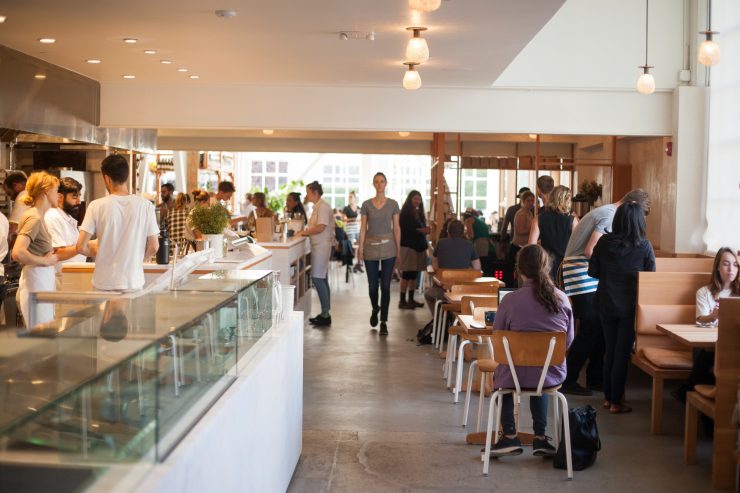
Chad Robertson and Elisabeth Prueitt’s Tartine has, since its opening 15 years ago, been a mecca for baked goods fans, their gougère, vaunted morning buns, and the like accruing both a following and a staggering line. But what is a near perfect baked good without an amazing cup of coffee to go along with it? Over the course of the last decade and a half, Robertson and Prueitt have worked with an A-list of Bay Area coffee providers—Mr. Espresso, Four Barrel Coffee, Counter Culture Coffee—and of course, Blue Bottle Coffee. So when it was announced last year that the two Bay Area darlings would be merging to, quite frankly, take over the world, people swooned, groused, and felt waves of artisanal excitement. Pair this with Tartine’s ambitious project, The Manufactory—a restaurant/coffee shop/ice cream parlor/bar/bread baking factory in The Mission—and it seemed the next logical step in Tartine’s slow, but strategic, expansion was off and running.
And then it wasn’t. Blue Bottle and Tartine called off the merger, and The Manufactory’s windows stayed plastered over with butcher paper. Plans for Tartine Tokyo, Tartine New York, and Tartine London suddenly seemed to evaporate, like so much Marsala in tiramisu. But happily there was to be a second act: though it seemed to take forever, the curtain on The Manufactory’s 5,000-square-foot space opened earlier this summer, as first reported in an orchestrated debut in no less august a publication than The Wall Street Journal. The space serves a full menu—baked goods to breakfast to dinner to dessert, coffee to cocktails—and already sports a new line tumbling around the block. And though Tartine had paired, briefly, with North Carolina’s Counter Culture for coffee service, the question still remained: who’s coffee would Tartine be serving to their rabid fans? How would they manage the coffee service in this, their temple mount to the glutenous arts?
As it turns out, they decided to serve their own.
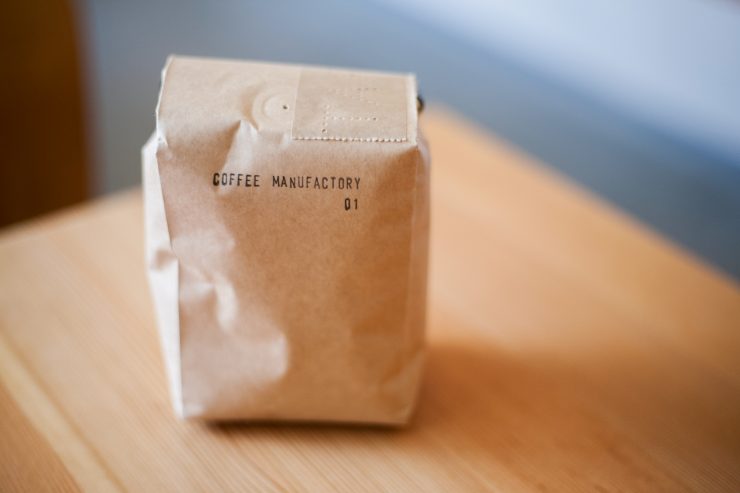
Tartine Manufactory is the foundational stone in a new era of Tartine, one that would not only expand their ability to produce Robertson’s famed bread for wider consumption but allow them to test the waters on future expansion concepts. A Tartine Ice Cream shop? Could be. Tartine Donuts? Not out of the question. With the doors open, though, it’s become apparent that Tartine is done with the hand-holding of a local coffee company; instead they’ll move forward with Coffee Manufactory, a fully realized roaster and coffee brand brought into existence by an all-star team of coffee experts. It’s a coffee brand that would not only expand along with Tartine as it inevitably does, but a brand that would stand on its own two feet, a commingling of the Tartine philosophy and the years of experience held by the folks running the show.
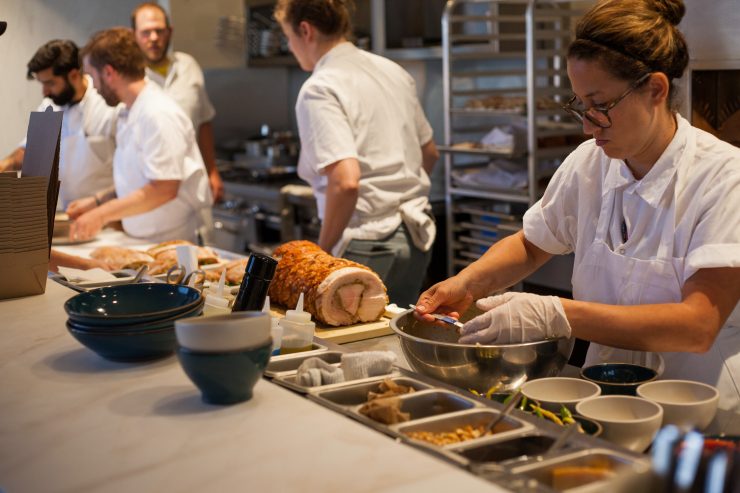
Within the gorgeous, 5,000-square-foot space of The Manufactory—all shining white tiles, light wood, and dangling spherical lamps looking like oversized Chinese lanterns—you might think that the small coffee kiosk, tucked away across from the register, would signal coffee as an afterthought, another piece in Tartine’s new, burgeoning food puzzle. It’s not. As Robertson told me, “This was all in the plans long before Blue Bottle. The idea of solving the puzzle of really good food with really good coffee is something we’ve been trying to do at the bakery forever.” To do so he reached out to Chris Jordan, a coffee legend who has spent time as Starbuck’s Director of Coffee Quality and at Santa Cruz’s Verve Coffee Roasters (to show just a sliver of a life lived in global coffee). Jordan is now the Chief Operations Officer of Tartine, and a sometimes surfing companion for Robertson. “After the Blue Bottle thing fell apart, Chad and Liz were looking for a coffee provider,” Jordan says. “They asked me ‘Who do you think is great?’ and my first response was ‘You should do it yourself.’” When Robertson expressed fears over just how complicated starting a roaster and a coffee brand might be, Jordan’s response was simple: “It doesn’t have to be.”
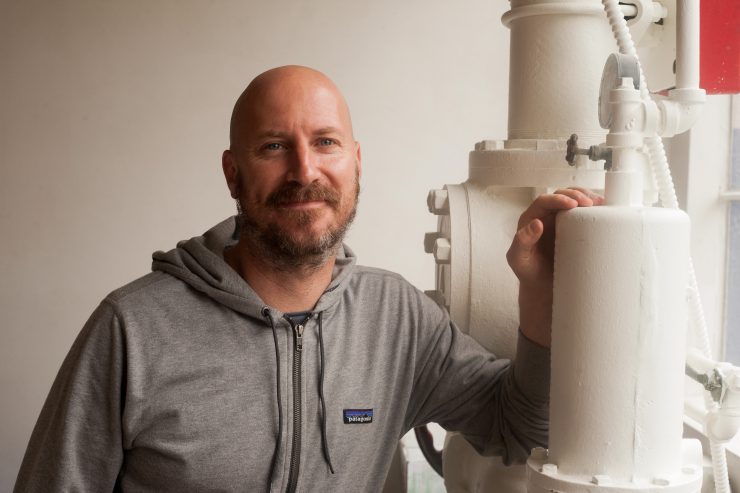
Tartine Chief Operations Officer Chris Jordan
Removing the “complication” from the process started with Jordan hiring the right people to oversee the new venture. During his stint at Verve, he’d worked with Devin Chapman, Maja Vojnovic, and Jeremy Brooks, a trio of Young Turks in the coffee world looking to make their marks outside of Verve’s umbrella. “We were very lucky to have gotten Devin, Maja, and Jeremy right off the bat,” Jordan says. “The biggest challenge is getting great people. How do you get big people to come and work with you and let them grow and feel supported in that environment?”
Chapman, who’s in charge of the retail experience for The Manufactory and all of its many coffee-related limbs going forward, has found inspiration in what he describes as “Tartine’s utilitarian ethos,” the idea that like Robertson does with bread, the Coffee Manufactory team wants to bring the most simple expression of the very best product they can offer—in this case, coffee. As Chapman tells it, “I’ve drawn a lot of inspiration from what Chad has done with bread, this product that started out as this rustic, handmade thing, before turning into a sliced and bagged type of deal.” For Chapman, coffee has a similar history: a beautiful product consumed by millions every day as an afterthought, something to get them up and moving or to slurp on with breakfast. “What we’re looking for,” Chapman says, “in terms of sourcing, roasting, and brewing is to take something innately incredible and show, without having to talk about it, that this is what tastes good.”
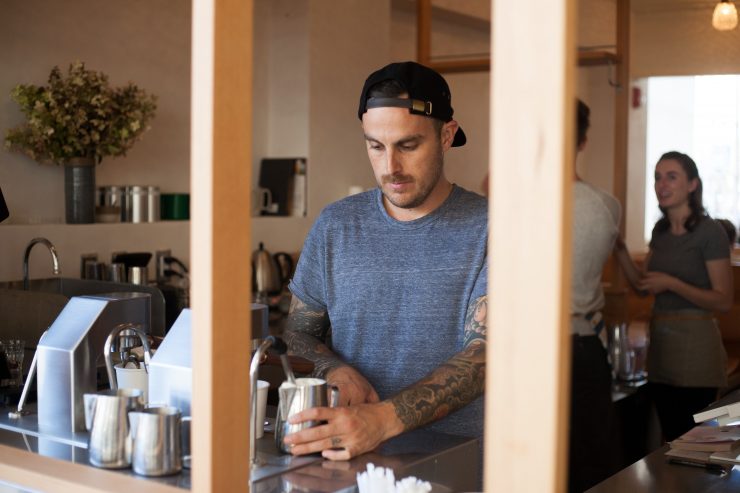
Devin Chapman, Director of Coffee Retail
Chapman, as well as Brooks and Vojnovic (in charge of sourcing, roasting, and wholesale respectively), aren’t lacking in knowledge about the nuances of coffee, but their goal is to produce a product that’s both appealing and delicious to everyone. Without putting too fine a point on it, they want to be the Tartine of Coffee, and not just the coffee at Tartine.
“Geeky types are going to get geeky about denim or keyboards or food,” Chapman says, “their nature is going to take over regardless. Presenting something that is very simplified and palatable for the people that aren’t that way, now that’s a very large untapped market. And those are the people I want drinking our coffee regularly.” You can see this thought in action when looking at the design of Coffee Manufactory’s bags; they’re simple and attractive, in line with The Manufactory’s overall aesthetic—craft-paper brown with a single stripe of color and a number (01, 02, and 03 as of now) identifying which blend a customer is looking at—but the simplicity doesn’t come without reason. “Our approach,” Vojnovic explains, “when it comes to customer education is, ‘make it not too complicated.’” Each blend Brooks and his team have put together is identified by the number on the bag—01 for a rounded, approachable espresso, 02 for their stripped down, standalone filter blend, and 03 for a rotating single origin—with the idea being that the regular coffee customer, one who doesn’t need to be inundated in coffee “education” can simply walk in, grab their preferred number, and walk out.
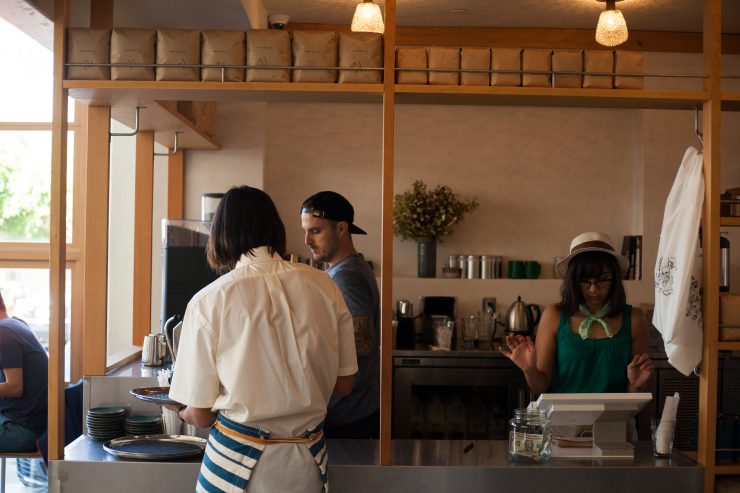
Even the information on the bag has been pared down to the must-knows: the components of the blend and the process behind the beans. “We don’t even do tasting notes,” Chapman tells me, arguing that coffee changes so frequently and that tasting notes are so subjective to an individual experience, that having them on a bag can actually backfire. “You tell someone there’s a hint of citrus zest in a coffee, maybe someone doesn’t buy it because they don’t like citrus,” Chapman says, “or maybe, because they don’t taste citrus, they think the coffee isn’t up to par.”
In a quest for simplification Chapman has done away with the focus on latte art, again citing that customers expecting perfection might overlook the actual experience of tasting the coffee, instead focusing on how symmetrical the rosetta floating on the top of their coffee might be. By stripping down the experience for the average, non-specialized coffee drinker, Chapman, Vojnovic, and Brooks hope to be able to provide the highest quality of coffee, without complication, to the largest number of people. Simplicity doesn’t detract from quality; simplicity merely opens the doors to those who might be put off by an overabundance of information. You see it even in the cafe’s coffee bar design, where an undercounter MAVAM espresso machine serves to break down the wall between the Manufactory’s baristas and its guests. Devin Chapman put it succinctly: “I love getting geeky about brewing and extraction, but we don’t need to subject other people to that. We just need to put in the effort, make it taste good.”
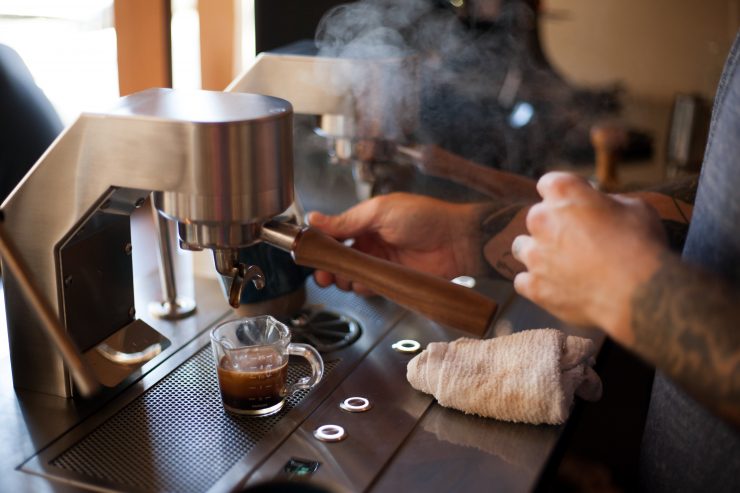
For Tartine, The Manufactory, and the Coffee Manufactory, the ceiling for the future seems unlimited. Each branch of The Manufactory’s food program—coffee, ice cream, donuts, bread, etc.—is seen as a possible offshoot for a new limb of the business. Robertson and Jordan talk about a future grain milling and green coffee roasting facility they’ll open in Los Angeles in the coming months. There’s renewed discussion about opening in New York and London and beyond. But for now, for the trio of coffee folk working 60-hour weeks, trying to insert themselves into the ultra-competitive San Francisco specialty coffee market, the focus is on pouring the foundation for what they can only hope is a long and successful future. In Jordan’s words, “We want to be obsessive about quality. We’ll take that first. It’s more about quality then being big or small.”
“Right now,” Chapman says, “we’re literally in the basement. We have so much room to grow. We all have a lot invested in this company.” Though Coffee Manufactory will go where Tartine goes, there’s talk about future Coffee Manufactory cafes featuring Tartine baked goods and bread. Each of these cafes could be further outposts to spread the “utilitarian” gospel of uncomplicated, delicious coffee intended for each and all, from obsessive New Wave coffee geek to 85-year-old grandmas—Chapman’s grandma, to be specific.
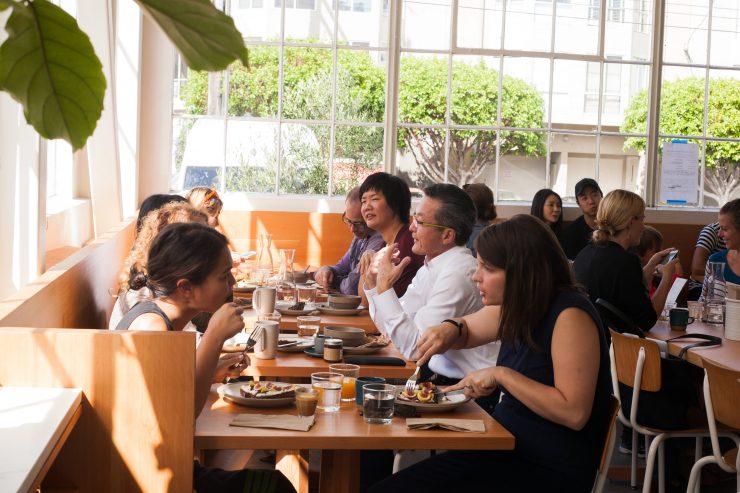
“My ultimate professional goal is that the worth of coffee goes up and up each year,” he says. “We want to be creating new avenues and this is a way to do just that. If my grandma, who just turned 85 came and wanted to buy coffee, I want this to be something that wouldn’t be offensive to her. There wouldn’t be a bunch of words she couldn’t say.” Chapman thinks about this a moment, and then finishes the thought: “She’s really a steak-and-potatoes type of lady.”
Tartine Manufactory is located at 595 Alabama Street, San Francisco. Visit their official website and follow them on Twitter and Instagram.
Noah Sanders (@sandersnoah) is a Sprudge.com staff writer based in San Francisco, and a contributor to SF Weekly, Side One Track One, and The Bold Italic. Read more Noah Sanders on Sprudge.
The post Tartine’s Coffee Manufactory: Roasting Destiny In San Francisco appeared first on Sprudge.

